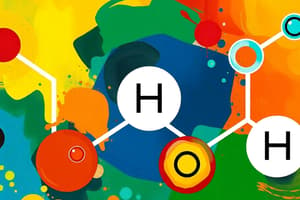Podcast
Questions and Answers
What is a characteristic reaction of alkenes and alkynes?
What is a characteristic reaction of alkenes and alkynes?
- Substitution reactions
- Addition reactions (correct)
- Dehydration reactions
- Elimination reactions
Which structural formula explicitly shows the arrangement of atoms in a molecule?
Which structural formula explicitly shows the arrangement of atoms in a molecule?
- Structural formula (correct)
- Condensed structural formula
- Line-angle formula
- Molecular model
How do larger molecules affect boiling points compared to smaller molecules?
How do larger molecules affect boiling points compared to smaller molecules?
- They do not affect boiling points.
- They have lower boiling points.
- They have higher boiling points. (correct)
- They only affect melting points.
What functional group is present in alcohols?
What functional group is present in alcohols?
Why is stereochemistry important in biological systems?
Why is stereochemistry important in biological systems?
What is a defining characteristic of hydrocarbons?
What is a defining characteristic of hydrocarbons?
Which functional group is represented by the formula -COOH?
Which functional group is represented by the formula -COOH?
Which type of isomerism refers to molecules with the same connectivity but different spatial arrangements?
Which type of isomerism refers to molecules with the same connectivity but different spatial arrangements?
What is the primary reaction that alkanes typically undergo?
What is the primary reaction that alkanes typically undergo?
What distinguishes alkenes from alkanes?
What distinguishes alkenes from alkanes?
Which of the following is true about isomers?
Which of the following is true about isomers?
What is the role of functional groups in organic chemistry?
What is the role of functional groups in organic chemistry?
What is the common suffix used in IUPAC nomenclature for alcohols?
What is the common suffix used in IUPAC nomenclature for alcohols?
Flashcards
What are alkenes?
What are alkenes?
Hydrocarbons with a carbon-carbon double bond.
What is an alcohol?
What is an alcohol?
The presence of a functional group like -OH (hydroxyl group) differentiates alcohols from hydrocarbons.
What are aldehydes and ketones?
What are aldehydes and ketones?
A carbonyl group (C=O) distinguishes aldehydes and ketones, differing only in its position within the molecule.
What is stereochemistry?
What is stereochemistry?
Signup and view all the flashcards
How are molecular structures represented?
How are molecular structures represented?
Signup and view all the flashcards
What is Organic Chemistry?
What is Organic Chemistry?
Signup and view all the flashcards
What are Functional Groups?
What are Functional Groups?
Signup and view all the flashcards
What are Isomers?
What are Isomers?
Signup and view all the flashcards
What are Hydrocarbons?
What are Hydrocarbons?
Signup and view all the flashcards
What is IUPAC Nomenclature?
What is IUPAC Nomenclature?
Signup and view all the flashcards
Study Notes
Introduction to Organic Chemistry
- Organic chemistry is the study of carbon-containing compounds.
- Carbon's unique ability to form four covalent bonds allows for a vast array of complex structures.
- Organic molecules can range from simple, such as methane (CH₄), to incredibly complex, like proteins and DNA.
- Organic compounds are crucial for life as we know it.
Functional Groups
- Functional groups are specific groups of atoms within molecules responsible for most characteristic chemical reactions.
- Identifying the functional group is often the first step in predicting a molecule's behavior.
- Common functional groups include:
- Alkanes (single bonds)
- Alkenes (double bonds)
- Alkynes (triple bonds)
- Alcohols (-OH)
- Carboxylic acids (-COOH)
- Amines (-NH₂)
- Aldehydes (-CHO)
- Ketones (C=O)
Isomerism
- Isomers are molecules with the same molecular formula but different structures and properties.
- Structural isomers differ in the connectivity of atoms.
- Stereoisomers have the same connectivity but different spatial arrangements.
- Geometric isomers differ in arrangement around a double bond or ring.
- Enantiomers are non-superimposable mirror images, rotating plane-polarized light in opposite directions.
- Diastereomers are stereoisomers that are not mirror images.
Hydrocarbons
- Hydrocarbons are organic compounds composed solely of carbon and hydrogen.
- Alkanes consist only of single bonds, are saturated, and usually unreactive.
- Alkenes contain at least one carbon-carbon double bond, are unsaturated, and are more reactive than alkanes.
- Alkynes contain at least one carbon-carbon triple bond, are unsaturated, and highly reactive.
- Naming follows standardized rules to accurately name isomers.
IUPAC Nomenclature
- IUPAC (International Union of Pure and Applied Chemistry) provides a systematic method for naming organic compounds.
- Nomenclature is based on prefixes for carbon number and suffixes for functional groups.
- Systematic naming prevents ambiguity, particularly for complex structures.
Alkanes, Alkenes, and Alkynes Properties and Reactions
- Alkanes are typically unreactive, with primary reactions being combustion.
- Alkenes and alkynes are more reactive due to multiple bonds, undergoing addition reactions.
- Physical properties like melting and boiling points are affected by size and structure. Larger molecules have higher boiling points; branched structures, lower boiling points.
Other Important Classes of Organic Compounds
- Alcohols contain a hydroxyl group (-OH), forming hydrogen bonds and exhibiting distinct properties from hydrocarbons.
- Ethers have an oxygen atom between two carbon groups.
- Aldehydes and ketones contain a carbonyl group (C=O), differing in location within the molecule.
- Carboxylic acids possess a carboxyl group (-COOH), exhibiting acidic characteristics.
- Amines and amides contain nitrogen atoms and are crucial in biological systems.
Other Concepts and Ideas
- Structural formulas explicitly display atom arrangement.
- Condensed structural formulas are a shorthand representation.
- Line-angle formulas are even more concise.
- Molecular models visualize 3D structure.
Introduction to Stereochemistry
- Stereochemistry examines the spatial arrangement of atoms in molecules.
- In biological systems, even minor structural changes can significantly alter function.
- Understanding stereoisomers helps interpret molecular behavior in reactions and biological processes.
Studying That Suits You
Use AI to generate personalized quizzes and flashcards to suit your learning preferences.




